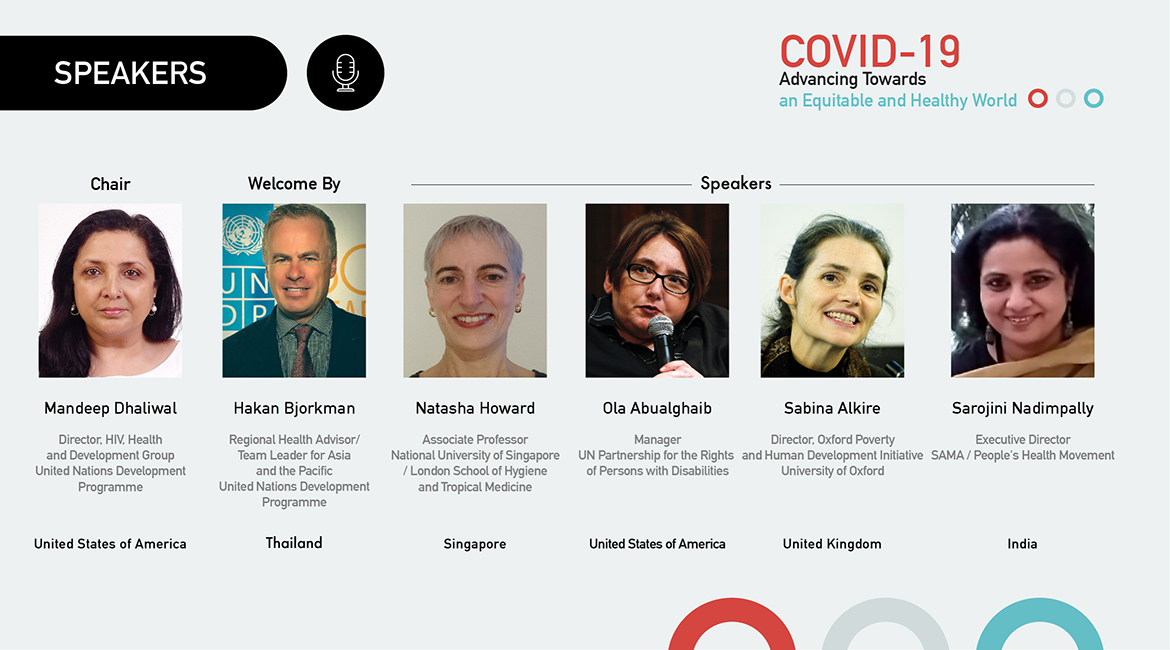WS101
The Socioeconomic Impact of COVID-19 from an Equity Perspective - Who is Being Left Behind and Lessons for the Future
Contact Person : Kazuyuki Uji, kazuyuki.uji@undp.org
11
Nov

The COVID-19 pandemic is both a public health crisis and a development crisis. What started as a localized health outbreak has quickly turned into a global development crisis with unknown prospects on the extent of impacts in different areas of development and for different populations. Beyond the health consequences, policy measures designed to prevent, manage and contain COVID-19 have triggered far-reaching socio-economic challenges, which exacerbate the existing plights and inequalities and are likely to be widely felt for years to come. The pandemic is already reversing many years of development gains and poses a serious threat to the progress on the Sustainable Development Goals (SDGs).
The impact of the COVID-19 pandemic cuts across the SDGs with a significant risk of increasing the number of people to be left behind. For example, over 70 million people could be pushed back into extreme poverty in 2020, the first increase in global poverty since 1998 (relevant to SDG 1); the pandemic could force up to additional 132 million people into hunger this year (SDG 2); an unprecedented rise of domestic violence against women has been observed following the lockdown (SDG 5); the pandemic caused a 14% reduction in global working hours in Q2/2020, equivalent to 400 million full-time jobs, with disproportionate impacts on women, young and informal workers (SDG 11); and timely COVID-19 information and services as well as relief measures are often inaccessible for certain populations such as persons with disabilities and ethnic minorities (SDG 10); LGBTI people have been subjected to human rights abuses, violence or exclusion due to increased policing/surveillance, gender binary emergency measures, or the scapegoating of the LGBTI community for the COVID-19 spread (SDG 16).
Vulnerable populations are experiencing multiple socioeconomic challenges simultaneously. These socioeconomic impacts in turn increase people’s exposure and vulnerability to COVID-19 and other health risks, fuelling and sustaining the vicious cycle with disproportionate short- and long-term consequences for vulnerable and marginalized populations.
On the other hand, the unprecedented circumstances brought by COVID-19 have created policy space and a social environment conducive to extraordinary measures and innovations that would not be possible in ordinary times. There are measures designed to protect people, particularly vulnerable populations, from both COVID-19 and socioeconomic risks and harms with pro-equity potentials. Examples include global efforts to ensure equitable access to COVID-19 health technologies, heightened policy debates on temporary basic income, temporary banning of the sale of tobacco and alcohol products, free provision of water and electricity in underserved communities, and the engagement of vulnerable groups into national COVID-19 decision-making processes, among others.
This session will explore the socioeconomic impacts of the COVID-19 pandemic particularly from an equity angle, examining who is being left behind and why, how heightened socioeconomic vulnerabilities and inequalities created barriers for effective COVID responses, lessons learned and emerging innovative thinking and measures to strengthen the resilience of the country and the vulnerable community in line with the PMAC 2021 theme of ‘advancing an equitable and healthy world.’
SPEAKERS
Biosketch
Mandeep Dhaliwal
Natasha Howard
Ola Abualghaib
Sabina Alkire
Sarojini Nadimpally





